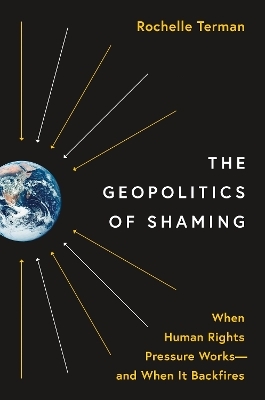
The Geopolitics of Shaming
When Human Rights Pressure Works—and When It Backfires
Seiten
2023
Princeton University Press (Verlag)
978-0-691-25048-9 (ISBN)
Princeton University Press (Verlag)
978-0-691-25048-9 (ISBN)
A bold new perspective on the strategic logic of international human rights enforcement
When a government violates the rights of its citizens, the international community can respond by exerting moral pressure and urging reform. Yet many of the most egregious violations appear to go unpunished. In many cases, shaming not only fails to induce compliance but also incites a backlash, provoking resistance and worsening human rights practices. The Geopolitics of Shaming presents a new theory on the strategic logic of international human rights enforcement, revealing why and how states punish violations in other countries, when shaming leads to an improvement in human rights conditions, and when it backfires.
Drawing on a wide range of evidence—from large-scale cross-national data to original survey experiments and detailed case studies—Rochelle Terman shows how human rights shaming is a deeply political process, one that operates in and through strategic relationships. Arguing that preexisting geopolitical relationships condition both the causes and consequences of shaming in world politics, she shows how adversaries are quick to condemn human rights abuses but often provoke a counterproductive response, while friends and allies are the most effective shamers but can be reluctant to impose meaningful sanctions.
Upending conventional wisdom on the role of norms in world affairs, The Geopolitics of Shaming demonstrates that politicization is integral to—not a corruption of—the success of the global human rights project.
When a government violates the rights of its citizens, the international community can respond by exerting moral pressure and urging reform. Yet many of the most egregious violations appear to go unpunished. In many cases, shaming not only fails to induce compliance but also incites a backlash, provoking resistance and worsening human rights practices. The Geopolitics of Shaming presents a new theory on the strategic logic of international human rights enforcement, revealing why and how states punish violations in other countries, when shaming leads to an improvement in human rights conditions, and when it backfires.
Drawing on a wide range of evidence—from large-scale cross-national data to original survey experiments and detailed case studies—Rochelle Terman shows how human rights shaming is a deeply political process, one that operates in and through strategic relationships. Arguing that preexisting geopolitical relationships condition both the causes and consequences of shaming in world politics, she shows how adversaries are quick to condemn human rights abuses but often provoke a counterproductive response, while friends and allies are the most effective shamers but can be reluctant to impose meaningful sanctions.
Upending conventional wisdom on the role of norms in world affairs, The Geopolitics of Shaming demonstrates that politicization is integral to—not a corruption of—the success of the global human rights project.
Rochelle Terman is assistant professor of political science at the University of Chicago.
| Erscheinungsdatum | 02.11.2023 |
|---|---|
| Reihe/Serie | Princeton Studies in International History and Politics |
| Zusatzinfo | 12 b/w illus. 8 tables. |
| Verlagsort | New Jersey |
| Sprache | englisch |
| Maße | 156 x 235 mm |
| Themenwelt | Sozialwissenschaften ► Politik / Verwaltung ► Europäische / Internationale Politik |
| Sozialwissenschaften ► Politik / Verwaltung ► Politische Theorie | |
| ISBN-10 | 0-691-25048-0 / 0691250480 |
| ISBN-13 | 978-0-691-25048-9 / 9780691250489 |
| Zustand | Neuware |
| Haben Sie eine Frage zum Produkt? |
Mehr entdecken
aus dem Bereich
aus dem Bereich
Studienbuch
Buch | Hardcover (2023)
De Gruyter Oldenbourg (Verlag)
CHF 62,90
erfolgreiche Interessenvertretung durch Prozesskompetenz im komplexen …
Buch | Hardcover (2023)
Wiley-VCH (Verlag)
CHF 58,75


